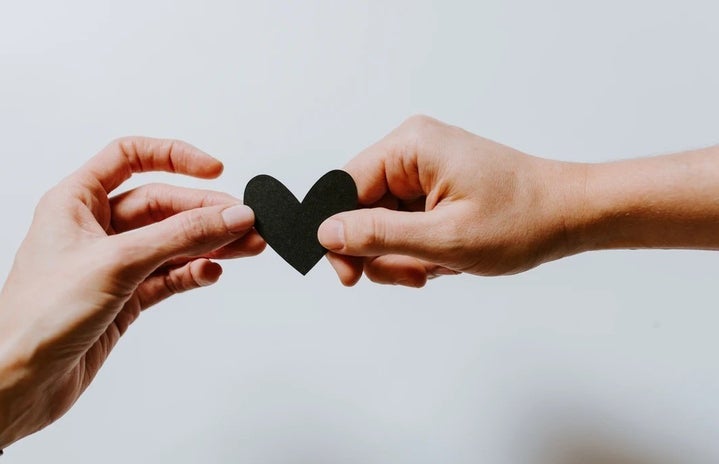Do you ever feel like you’re constantly putting others first? Are you always putting everyone else’s needs before your own? You may be finding that you’re skipping work to comfort a friend or doing things you may not want to or have time for because others want you to. You probably feel constantly behind and constantly drained. You probably don’t feel like you have time for yourself. Most importantly, you probably feel happier helping other people than when you help yourself. You may not have the emotional or mental stamina to focus on yourself because you’ve spent all that energy on someone else. Essentially, you are dependent on someone else. This is what codependency is, and it is exhausting.
From my experience and understanding, codependency is the idea of relying on others for your happiness. This is obviously a general definition but this includes constantly putting other people first (even at the expense of yourself), ignoring your responsibilities to be there for others (so much so that you’re canceling things you were looking forward to because someone is in need of you), or taking on someone else’s work load even if you are swamped yourself. Codependency is having no boundaries in your relationships and having a difficult time saying no. I like to think of it as living for someone else rather than yourself.
There are multiple causes behind the development of codependency, but it is mostly a result of childhood trauma. The problem here is that growing up we are unintentionally taught to feel valued and validated based on how much we benefit others: whether that be how many chores we do for our parents, choosing to sit in the back seat instead of the front, volunteering to do the more difficult work, helping a friend in need. These activities are not inherently causing codependency. The issue is that the validation and value that we receive from these self-sacrifice-based scenarios outweighed any other form of praise and worth we felt in other scenarios. We learned that pleasing others was the best way to feel good. After all, every kid is told to be kind and good. But being too kind and too good to others can cause a plethora of problems that we don’t recognize until later on in life.
I want to make this clear: this is just a basic explanation on how codependency forms. But if you’re reading this and find yourself saying, “oh, that is me too”—you are probably codependent and do not even realize it. Unfortunately, a lot of people are in the same boat and don’t come to this realization until later in life.
I read this amazing book called, “Codependent No More,” by Melodie Beatte. In it she describes ways in which codependency can present itself. The ways it can show up in your life are various, complicated, and most of them time unrecognizable by the self. This includes feeling responsible for the feelings or personnel issues of other people, trying to constantly please others or being a push-over, offering advice on a subject even if no one asks, feeling worthless or blue until you are needed by others, have difficulty expressing your feelings and opinions out of fear that people will leave you if you express your true self, avoiding thinking about what you want, doing things for others at the expense of yourself, and staying in relationships or friendships even though the other person constantly hurts you.
I don’t want you to realize years from now that this is you. I’m writing this article so you realize it now. If you are not relating to this, if this isn’t you, consider this a guide in preventing codependency in your own relationships. This is not an official statistic, but it is widely recognized in codependency literature that most people at some point in their lives are a victim to it. Here are some things I learned to combat codependency that you can use:
1. Radical Self-Love and Respect:
Codependency can develop because we do not value ourselves enough. This could mean sacrificing “me” time because someone else wants or needs us. This can mean putting off work you really need to do because you thrive off of being there for someone struggling. You may miss deadlines, be late on assignments, miss out on sleep to hang with friends, forget or blow off important appointments. You are essentially putting everyone else above yourself every chance you get. As explained earlier, it is because you knowingly or unknowingly crave and thrive off of the attention, validation, and worth others give you. The best way to combat this is to give yourself the exact same attention, validation, and worth others give you. You need self-love, self-respect, and self-discipline. You need to choose yourself sometimes. You need to recognize and make the effort to prioritize yourself. We may avoid this sometimes because it seems selfish. I am here to tell you that it is not. And if that is not enough, let me tell you this: it is okay to be selfish. It is okay to put yourself first. As soon as you start practicing radical self-love, your happiness and self-worth will increase significantly.
2. Say “No” More:
Building on this sense of self-respect means saying no when you can’t or don’t want to do something. Instead of sacrificing your time constantly, learn to be honest with yourself and don’t commit to things you know are going to take away from the things you need or want to do. This can seem incredibly daunting, I know. It can be easy to assume that your friends will leave you because you are not at their beck and call 24/7. Real friends, however, are empathetic and understanding. If you struggle with saying no like I do, I recommend starting small. If you don’t want to eat at a place that everyone else wants to, vocalize that instead of caving in. If you are too busy to hang out with a friend, ask to reschedule for a future date. If you have study plans with a buddy but have difficulty studying with someone else, ask to study by yourself. This can then lead to you being more comfortable with saying no and eventually lead to you saying no to big things. Maybe a friend needs a ride to the airport two hours away and they need the ride at 3am. Say no. Or maybe someone wants you to pay for their meal. Say no. You have agency in your own life, and learning to say no can help you achieve that.
3. Boundaries are Your Best Friend:
The idea of boundaries builds upon the idea of self-discipline and saying no. Too often have I found myself doing things late at night with people even though I wanted to go to sleep. Too often have I found myself discussing a sensitive subject with somebody even though I really did not want to. Too often have I been asked to do things I was not comfortable doing. The best way to defeat this is by setting up a boundary. If you want to go to bed at a certain time, make it clear to your friends and everyone else in your life that that is the time you go to bed and any hang-outs or study sessions must be done by that time. If someone tries to insist you stay up, say that this is important to you, that you are not changing your mind, and that they respect your time and energy. If you are talking about something sensitive like politics or religion and you really do not want to, say that you do not want to talk about those subjects and tell the other person that you will leave if they bring up those topics. You do not have to suffer through things because someone else wants you to. You don’t have to participate in anything you do not want. And if someone insists that you must, it is time to set up a boundary. You are not responsible for how they feel when you set up that boundary, that is a problem for them to figure out. You must love and respect yourself enough to put yourself first.
These are just a few things that have helped me in my journey with codependency. I obviously do not know everything about the subject and am still learning, but I figured I would share with you what I know because it is about time we start putting ourselves first. A fear I have had my entire life is that I will be on my deathbed, looking back at my life and realizing that everything I did and achieved was because somebody else wanted to expect me to do or achieve that thing. This fear constantly puts my decisions and view of codependency in perspective. I do not want that experience on my deathbed. I want to be able to reflect back and be proud and grateful I was able to live a life I enjoyed. And these, with the help of a therapist, helped me get started. We all deserve the experience of looking at our lives knowing we lived it for ourselves. So take the first step now to combat codependency in your own life. You owe that to yourself.


